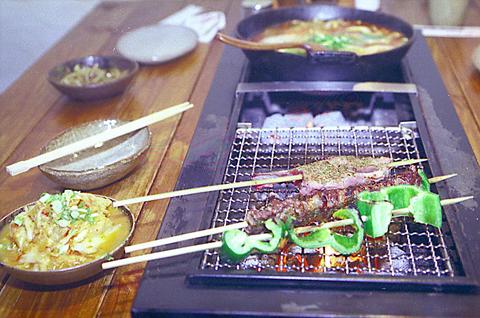To witness the popularity of barbecue in Taipei, look no further than the many barbecue restaurants lining the alleys behind Chunghsiao E. Rd. As the competition among them gets harsher and drives down prices, an increasing number have been struggling to survive.
But not Xinjiang Barbecue. The two-month-old Xinjiang-style restaurant has seen a full house nearly every day. Apart from a helpful staff and a comfortable dining environment, its success likely lies in being the first of its kind.

PHOTO: DAVID VAN DER VEEN, TAIPEI TIMES
More than an year ago, former interior designer Lin Yi-lung (林宜龍), along with a few of his friends, planned to jump on the barbecue bandwagon and were brainstorming for something to make their eatery stand out from the many Japanese-style restaurants to be found. "We learned that barbecue comes from the nomads of Xinjiang, where it was an integral part of life," Lin said.
The next thing they did was fly to China's far western province along with several cooks to learn the secrets to the authentic Xinjiang cuisine. They've become genuine lovers of the style of cuisine, still regularly sending cooks to Xinjiang to hone their skills.
Set up by a group of architects and interior designers, the restaurant looks inviting both inside and outside. A large mural of nomads in the wilderness adorns its facade and a wooden bridge carries customers across a goldfish pond to the door. Customers leave their shoes at the door before entering the homey restaurant and sitting on low benches.
The secret to the taste of Xinjiang barbecue is its use of a cumin-based mix of herbs and spices on untreated meat and vegetable skewers. "In Japanese-style barbecue, all the food is marinated. Here, customers season the untreated meat on the skewers using the condiments as they like," Lin said.
The lamb is very fresh and the beef tender and fragrant. "It's essential for the meat to be fresh. That's why we only need to use salt to bring out its sweetness and aroma," Lin said. "It's also important not to cook the meat for too long. It would kill its original flavor."
For an authentic taste of Xinjiang cooking, try the "leather teeth cold plate" (NT$50), a side dish that features neither leather nor teeth, but raw onion and cumin seeds in abundance. A rare find whose refreshing pungency goes well with skewered meats.
A common dish in Xinjiang, hand-scooped rice (NT$80) is a popular item whose fluffy grains are accompanied by mutton essence and carrots, along with other vegetables.
For desserts, Xinjiang Barbecue offers a wide range of options. Snowy sweet melon (NT$60) uses melons of a rare Xinjiang variety -- the only kind deemed sweet and aromatic enough for the fried roll. Its flour crust is impressively crispy.
Many brands of beer (NT$100) and imported liquors are also available in quaint, large wine bowls.

On April 26, The Lancet published a letter from two doctors at Taichung-based China Medical University Hospital (CMUH) warning that “Taiwan’s Health Care System is on the Brink of Collapse.” The authors said that “Years of policy inaction and mismanagement of resources have led to the National Health Insurance system operating under unsustainable conditions.” The pushback was immediate. Errors in the paper were quickly identified and publicized, to discredit the authors (the hospital apologized). CNA reported that CMUH said the letter described Taiwan in 2021 as having 62 nurses per 10,000 people, when the correct number was 78 nurses per 10,000

As we live longer, our risk of cognitive impairment is increasing. How can we delay the onset of symptoms? Do we have to give up every indulgence or can small changes make a difference? We asked neurologists for tips on how to keep our brains healthy for life. TAKE CARE OF YOUR HEALTH “All of the sensible things that apply to bodily health apply to brain health,” says Suzanne O’Sullivan, a consultant in neurology at the National Hospital for Neurology and Neurosurgery in London, and the author of The Age of Diagnosis. “When you’re 20, you can get away with absolute

When the South Vietnamese capital of Saigon fell to the North Vietnamese forces 50 years ago this week, it prompted a mass exodus of some 2 million people — hundreds of thousands fleeing perilously on small boats across open water to escape the communist regime. Many ultimately settled in Southern California’s Orange County in an area now known as “Little Saigon,” not far from Marine Corps Base Camp Pendleton, where the first refugees were airlifted upon reaching the US. The diaspora now also has significant populations in Virginia, Texas and Washington state, as well as in countries including France and Australia.

May 5 to May 11 What started out as friction between Taiwanese students at Taichung First High School and a Japanese head cook escalated dramatically over the first two weeks of May 1927. It began on April 30 when the cook’s wife knew that lotus starch used in that night’s dinner had rat feces in it, but failed to inform staff until the meal was already prepared. The students believed that her silence was intentional, and filed a complaint. The school’s Japanese administrators sided with the cook’s family, dismissing the students as troublemakers and clamping down on their freedoms — with